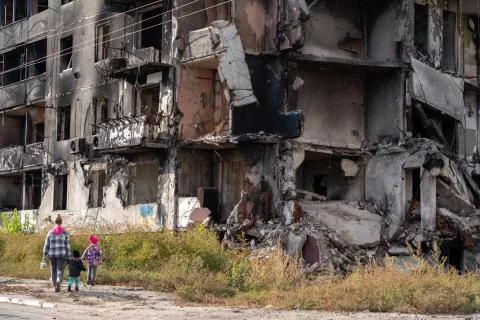Preparing for the deluge, a camp in Iraq is quickly built from scratch
In late 2015, the Debaga displacement camp in Iraq opened as a site to shelter families that were displaced nearby. The number of residents in the camp has since increased tenfold and continues to grow, putting a strain on resources

DEBAGA, Iraq, 9 August 2016 – On the outskirts of a dusty village in Iraq, a city is springing into existence.
Hundreds of people arrive at Debaga displacement camp every day.
“Four hundred of us left together,” says Ali*, who like many in the camp is from Haji Ali, south of Mosul in Ninewa Governorate. The group fled when conflict escalated in their village and the armed opposition group who had been in control for two years began losing ground. “We escaped and we went to the Tigris River,” he says.
On the road to the entrance of the camp, traffic slows to walking pace. Families have arrived any way they can – on foot, crammed into dilapidated cars and on the back of pickup trucks. Stalls and shelters line the roadside. In one, a man saws a large block of ice. In another, three boys escape the searing heat under a blue tarpaulin.

It’s sweltering. The road is filled with trucks bringing water and emergency humanitarian aid. Many of the children are not wearing shoes. Most people left home so suddenly that the only clothes they have are those they were wearing when they fled.
“Armed men came in to our house and they were shooting, they wanted to force us to go to another place to use us as human shields,” says Fatima*, a relative of Ali.
A steady influx exceeds capacity
Debaga was built to house just the displaced families living in informal settlements in the area. In November 2015 – about a month after it opened – Debaga camp hosted 3,300 people. That number has since increased tenfold.
The camp quickly expanded to a nearby sports stadium while another site is being constructed next to it. There are now more than 30,000 people spread across three sites, and about 15,000 more are expected in the coming months.
The second site, simply called The Stadium, is a dry grass football pitch flanked by two grandstands. In happier times, it was a countryside playing field with a few children kicking a ball around. Now it’s filled with rows of tents surrounded by a wire fence.

Shema and Nektal have been here for five days. They have six children aged from two months to ten years.
“We fled at night,” Nektal says. “There were about 200 of us from our village. We walked to Makhmour and received help to get here.”
Crossing a no man’s land between armed groups, Nektal’s younger brother stepped on a landmine. “We couldn’t carry him, we had to leave him there,” Nektal says.
There are two large tents at the entrance to The Stadium and they’re filled with women and children waiting to be allocated an individual tent.
Sanar is nursing nine-month-old Salafia, a cheerful infant with a chubby face and a scar on her left forearm.
“A bomb broke a window in our house,” Sanar says. “A shard of glass fell onto her arm. She was asleep when it happened; she slept right through it.”

Sanar fled with twelve family members, making the six hour journey on foot. When she arrived in Debaga camp, she received an emergency kit distributed as part of the UNICEF-led Rapid Response Mechanism. The food, water and hygiene supplies in the kit are helping her family to cope during their first days in the camp.
Grappling with logistical challenges
Outside the tent, dozens of people are lined up with buckets waiting to receive water. Adequate clean water is one of the most pressing issues facing the camp. UNICEF is trucking in 945,000 litres of drinkable water to the camp every day, which represents 35 litres per person. UNICEF is also supplying showers and latrines, and testing water quality constantly to ensure it remains safe.
The long term plan is to drill up to six boreholes. Work will soon start on a water network which will pipe water to the camp, eliminating the need for the 60 trucks that supply water there every day.

In the main transit centre in the camp, two new prefabricated containers are being lowered into position next to the camp clinic. UNICEF’s health and nutrition teams will use the containers as permanent immunization and growth monitoring units. Elsewhere in the camp, health workers in white coats ensure that children have caught-up on essential vaccinations against polio, measles, and other preventable illnesses.
Around the corner, children play in the camp’s UNICEF-supported child-friendly space. These spaces give children the chance to play sports, learn music, create art, spend time with friends, and just be children again.
As conflict in Iraq continues to prompt fresh waves of displacement, scenes such as those at Debaga will become more and more common.
“The logistical challenges are enormous,” says Chief of Erbil Office Maulid Warfa. “The situation is very fluid and constantly changing. We’re providing water and sanitation and emergency supplies. We’ve opened two child friendly spaces and we’re vaccinating children, but this is just the beginning. We have a lot of work ahead of us. Thousands more people are coming.”
*names have been changed


